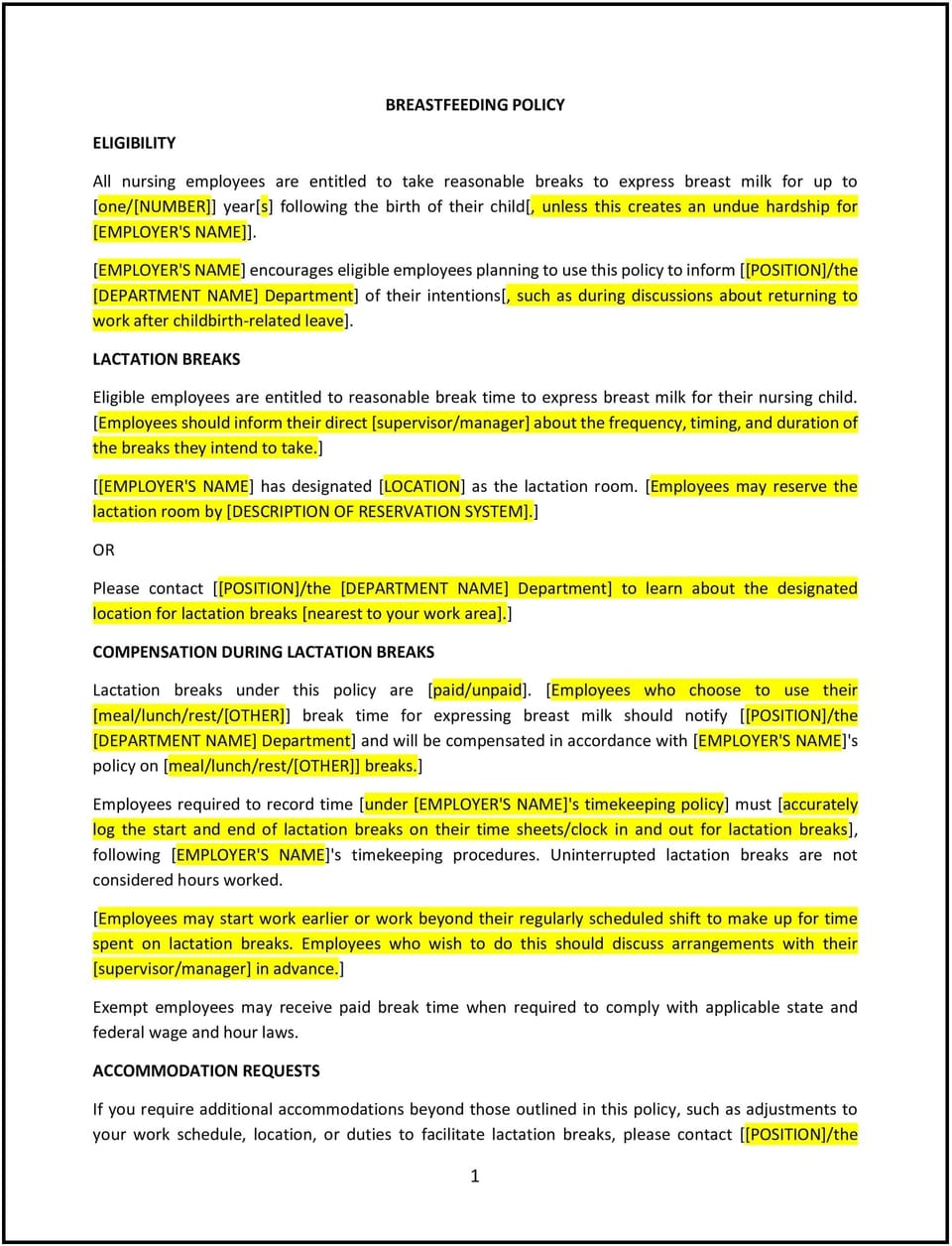Breastfeeding break policy (Arkansas): Free template

Breastfeeding break policy (Arkansas)
In Arkansas, a breastfeeding break policy provides employees with the time and space needed to express breast milk during work hours. This policy ensures compliance with state and federal laws, including the Fair Labor Standards Act (FLSA), while promoting a supportive and inclusive work environment for new mothers.
This policy outlines the business’s commitment to providing reasonable break time and private facilities for breastfeeding employees. By implementing this policy, Arkansas businesses can support employee health and well-being, improve retention, and foster a family-friendly workplace culture.
How to use this breastfeeding break policy (Arkansas)
- Provide reasonable break time: Specify that breastfeeding employees are entitled to reasonable unpaid break time to express milk, aligned with Arkansas and federal regulations.
- Designate private spaces: Ensure that a private, non-bathroom space is available for breastfeeding employees to express milk, equipped with seating, a table, and electrical outlets.
- Communicate procedures: Outline how employees can request accommodations or notify their manager about their need for breastfeeding breaks.
- Address scheduling: Work with employees to coordinate break times that minimize disruptions to business operations while meeting their needs.
- Ensure privacy and respect: Emphasize that the business will maintain the privacy of breastfeeding employees and treat all requests with respect and confidentiality.
Benefits of using this breastfeeding break policy (Arkansas)
This policy offers several advantages for Arkansas businesses:
- Promotes employee well-being: Supports the health of new mothers and their infants by accommodating breastfeeding needs during work hours.
- Enhances employee retention: Demonstrates a family-friendly culture, encouraging new mothers to return to work and remain with the business long-term.
- Improves workplace morale: Shows the business’s commitment to inclusivity and support for employees with diverse needs.
- Supports compliance: Aligns with Arkansas and federal laws requiring breastfeeding accommodations, reducing legal risks.
- Boosts productivity: Employees who feel supported in balancing work and family responsibilities are more likely to be engaged and productive.
Tips for using this breastfeeding break policy (Arkansas)
- Address Arkansas-specific considerations: Ensure the policy complies with state laws that may provide additional protections or requirements for breastfeeding employees.
- Train managers: Provide training to supervisors on how to handle breastfeeding break requests sensitively and in accordance with the policy.
- Maintain confidentiality: Protect the privacy of breastfeeding employees by ensuring their requests and accommodations are handled discreetly.
- Monitor implementation: Regularly review how the policy is applied and gather feedback from employees to make improvements as needed.
- Communicate openly: Include information about the policy in employee handbooks or during onboarding to ensure all employees are aware of their rights and the business’s commitment to supporting them.
Q: How does this policy benefit the business?
A: This policy supports employee health and well-being, enhances retention of new mothers, and demonstrates the business’s commitment to inclusivity and compliance with Arkansas and federal laws.
Q: What facilities must the business provide for breastfeeding employees?
A: The business must provide a private, non-bathroom space equipped with seating, a table, and electrical outlets, ensuring employees have a comfortable and secure environment to express milk.
Q: How does this policy support compliance with Arkansas laws?
A: The policy aligns with Arkansas breastfeeding accommodation laws and federal requirements under the FLSA, ensuring the business provides legally mandated support for breastfeeding employees.
Q: How should the business manage scheduling for breastfeeding breaks?
A: The business should work with employees to coordinate reasonable break times that minimize disruptions to operations while accommodating the employees’ needs.
Q: What steps can the business take to ensure the policy is applied fairly?
A: The business can train managers to handle requests consistently, maintain open communication with employees, and document all accommodations to ensure transparency and fairness.
This article contains general legal information and does not contain legal advice. Cobrief is not a law firm or a substitute for an attorney or law firm. The law is complex and changes often. For legal advice, please ask a lawyer.


